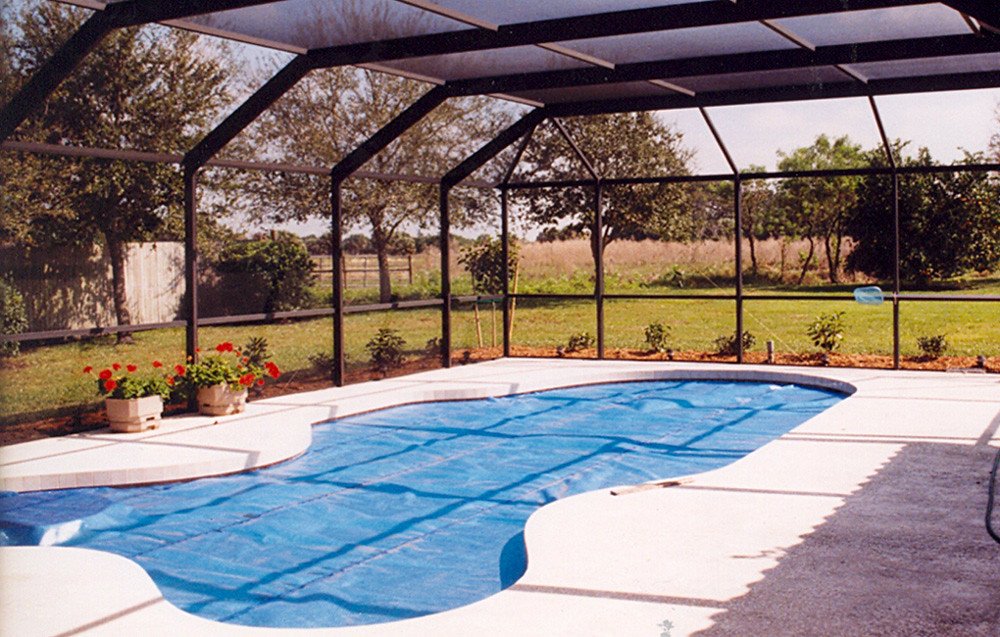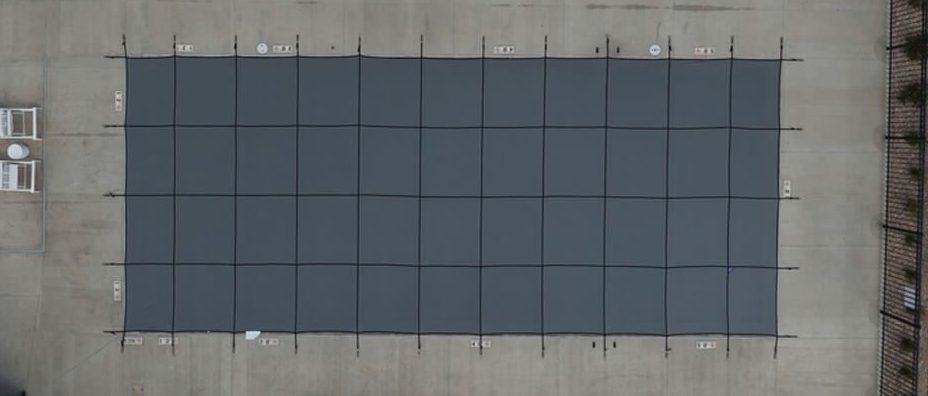A high-quality pool cover is essential for maintenance and safety. With several options available, choosing the right type can seem daunting. This guide explores the different types of pool covers, helping you understand their characteristics and benefits—whether you need debris protection, energy efficiency, or enhanced safety. Let’s examine the features, materials, and uses of various pool covers to help you select the perfect one for your needs.
I. Solar Pool Covers

Solar pool covers—also called solar blankets, bubble covers, or thermal covers—harness sunlight to heat pool water naturally. Made from durable, UV-resistant material, these covers retain heat and reduce evaporation by trapping solar energy and transferring it to the water.
Solar pool covers not only extend the swimming season but also reduce reliance on pool heaters, resulting in energy savings.
Pros:
- Energy Efficiency: Solar pool covers naturally heat the water by trapping and transferring solar energy. This efficient method reduces heating costs by eliminating the need for additional heating systems
- Extended Swimming Season: By retaining heat, solar covers extend your swimming season. They keep water comfortably warm, letting you enjoy your pool earlier in spring and later into fall—especially beneficial in cooler climates.
- Water Evaporation Reduction: Solar pool covers create a barrier that reduces water evaporation, conserving water and minimizing the need for refilling. This helps maintain proper water levels and reduces water bills.
- Chemical and Water Balance Preservation: By reducing evaporation, solar covers help maintain chemical balance and minimize chemical additions. They also block debris, reducing maintenance time and cleaning needs.
- UV Protection: These covers feature UV-resistant construction, protecting them from sun damage. This ensures their durability and longevity under prolonged sun exposure.
Cons:
- Limited Debris Protection: While solar covers offer some debris protection, they primarily focus on heat retention. They’re less effective at blocking leaves, twigs, or insects than solid or mesh covers, requiring additional cleaning.
- Removal and Storage: Solar pool covers can be unwieldy, especially for larger pools. While reel systems simplify rolling and unrolling, handling and storing these covers requires effort and space.
- Pool Accessibility: Unlike automatic covers, solar covers need manual removal before pool use. This extra step can be inconvenient for spontaneous or frequent swimming.
- Aesthetics: The visible floating cover may affect the pool’s appearance. Some owners prefer an unobstructed pool view.
- Cost: While solar covers offer long-term energy savings, they require an initial investment. Costs vary by pool size and cover quality, though energy savings typically offset the expense over time.
II. Winter Pool Covers / Mesh Covers

Winter pool covers protect and maintain pools during off-seasons or extended disuse. Made from heavy-duty reinforced vinyl or mesh, these durable covers withstand harsh weather, debris, and UV exposure.
These covers create a barrier against leaves, branches, and debris while reducing algae growth and maintaining water clarity. Choose between solid or mesh winter covers based on your specific needs.
Pros:
- Debris Protection: Winter pool covers excel at blocking leaves, twigs, and dirt, reducing cleaning and maintenance needs.
- Algae Prevention: By blocking sunlight, winter covers inhibit algae growth, maintaining water clarity and reducing chemical treatment needs.
- Protection Against Harsh Weather: These covers’ durable materials withstand snow, ice, and strong winds, protecting your pool from winter damage.
- Enhanced Safety: Winter and mesh covers provide additional security, offering protection when installed.
Cons:
- Installation and Removal Effort: Installing and removing winter covers requires significant effort, especially for larger pools. While cover reels and professional help can simplify the process, it remains labor-intensive.
- Limited Pool Access: Winter covers completely block pool access during off-season. This may not suit those wanting occasional winter swimming or pool-side events.
- Maintenance Requirements: These covers need regular care—including cleaning, damage inspection, and proper storage—to maintain their effectiveness.
- Aesthetics: A covered pool may appear less attractive during off-season, affecting the overall pool area’s appeal.
III. Automatic Pool Covers

Automatic pool covers offer ultimate convenience with motorized operation. Using sturdy vinyl or reinforced fabric, these covers open or close at the touch of a button via track-mounted systems.
These covers excel in debris protection, evaporation reduction, and safety. They’re ideal for larger pools or irregular shapes, offering custom fitting. Automatic covers provide superior safety, protection, and energy efficiency while enhancing pool aesthetics.
Pros:
- Ease of Use: Automatic covers operate effortlessly—just press a button to open or close. This convenience eliminates manual labor and physical strain.
- Enhanced Safety: These covers create a strong safety barrier, especially important for homes with children or pets. They prevent accidental falls and meet safety regulations, reducing drowning risks.
- Debris Protection: Automatic covers effectively block leaves, dirt, and insects, reducing cleaning time and maintaining water clarity.
- Energy Efficiency: By reducing heat loss and evaporation, automatic covers lower heating costs and minimize water and chemical use, creating significant long-term savings.
- Custom Fit and Aesthetics: These covers are custom-designed for perfect pool fit, enhancing overall appearance through seamless integration.
Cons:
- Cost: Automatic covers cost more than other types, including installation of motorized components. However, their long-term benefits often justify the investment.
- Maintenance and Repair: The motorized system requires regular maintenance and occasional repairs. Following manufacturer guidelines for upkeep is essential, and mechanical issues may need professional attention.
- Reliance on Power: These covers need electricity to operate. Power outages or electrical problems can prevent cover operation until resolved.
Conclusion
Choosing the right pool cover significantly impacts water quality, safety, and pool longevity. Consider your climate, usage patterns, and safety needs when selecting a cover. A well-informed choice leads to a cleaner, safer, and more energy-efficient pool year-round.


